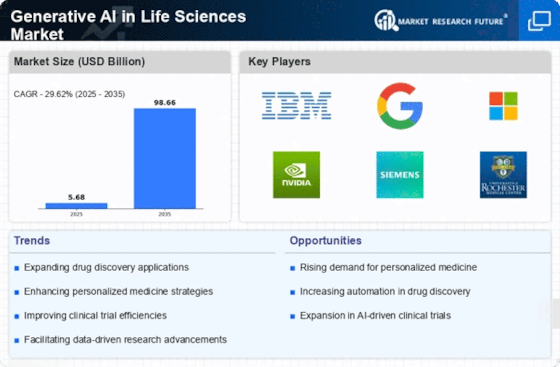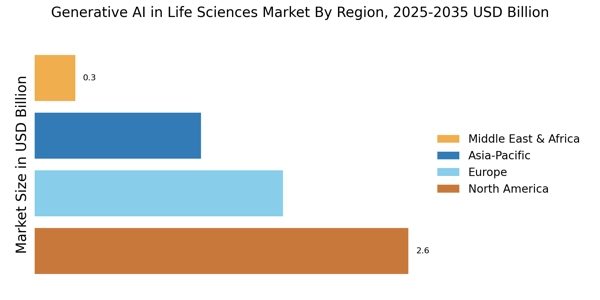Personalized Treatment Approaches
The shift towards personalized medicine is a key driver in the Generative AI in Life Sciences Market. Generative AI facilitates the development of tailored treatment plans based on individual patient data, including genetic information and lifestyle factors. This approach not only enhances treatment efficacy but also minimizes adverse effects, leading to improved patient outcomes. The market for personalized medicine is expected to reach USD 100 billion by 2026, driven by advancements in AI technologies. As healthcare providers increasingly adopt generative AI tools, the ability to deliver personalized therapies will likely become a standard practice, further propelling the growth of the life sciences sector.
Enhanced Data Analysis Capabilities
The Generative AI in Life Sciences Market is experiencing a surge in demand for advanced data analysis capabilities. This technology enables researchers to process vast amounts of biological data, leading to more accurate insights and predictions. For instance, the ability to analyze genomic data has improved significantly, allowing for the identification of potential drug targets with greater precision. As the volume of data generated in life sciences continues to grow, the reliance on generative AI tools is likely to increase. Reports indicate that the market for AI in life sciences is projected to reach USD 20 billion by 2027, highlighting the critical role of data analysis in driving innovation and efficiency in drug development and personalized medicine.
Integration of AI in Clinical Trials
The integration of generative AI in clinical trials represents a pivotal driver for the Generative AI in Life Sciences Market. By utilizing AI-driven analytics, researchers can optimize trial designs, identify suitable patient populations, and predict outcomes more accurately. This integration enhances the overall efficiency of clinical trials, potentially leading to faster approvals for new drugs. Moreover, AI can assist in monitoring patient data in real-time, ensuring adherence to protocols and improving safety. As the life sciences sector increasingly adopts AI technologies, the market for AI in clinical trials is projected to expand significantly, with estimates suggesting a growth rate of 25% annually. This trend underscores the importance of AI in transforming how clinical research is conducted.
Accelerated Drug Development Timelines
The Generative AI in Life Sciences Market is poised to transform drug development timelines. By leveraging AI algorithms, pharmaceutical companies can streamline the drug discovery process, reducing the time required to bring new therapies to market. This acceleration is particularly crucial in an environment where the demand for novel treatments is rising. For example, generative AI can simulate clinical trials, allowing researchers to identify the most promising candidates before actual testing. This capability not only shortens development cycles but also minimizes costs associated with failed trials. As a result, the generative AI market in life sciences is expected to grow at a compound annual growth rate of 30% over the next five years, reflecting its potential to enhance efficiency in drug development.
Cost Reduction in Research and Development
Cost reduction in research and development is a significant driver for the Generative AI in Life Sciences Market. By automating various processes, generative AI can substantially lower the costs associated with drug discovery and development. For instance, AI algorithms can predict molecular interactions, reducing the need for extensive laboratory testing. This efficiency not only saves time but also reallocates resources towards more promising research avenues. Industry analyses suggest that companies utilizing generative AI can reduce R&D costs by up to 40%, making it an attractive option for pharmaceutical firms. As the pressure to innovate while managing budgets intensifies, the adoption of generative AI in life sciences is likely to accelerate.

















